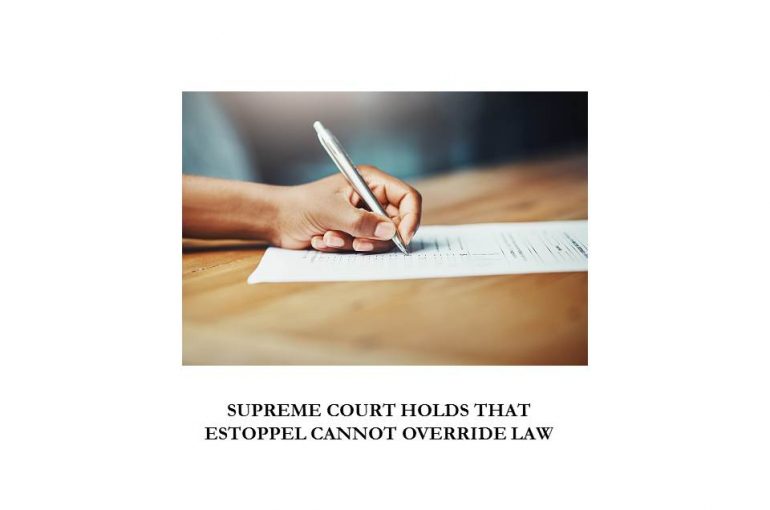SUPREME COURT HOLDS THAT ESTOPPEL CANNOT OVERRIDE LAW
A two Judge Bench of the Hon’ble Supreme Court of India comprising of Justice Dinesh Maheshwari and Justice Vikram Nath passed a Judgment dated 16-06-2022 in the case of Krishna Rai (Dead) Through LRs & Ors. versus Banaras Hindu University Through Registrar & Ors (Civil Appeal Nos. 45784580 of 2022 (Arising out of S.L.P.(C) Nos.3118688 of 2016) and reiterated that principle of estoppel or acquiescence will not apply in a selection process when it is held contrary to the relevant rules.
In the present case, the Banaras Hindu University, Varanasi (University) had issued a Notification/Advertisement dated 17-12-2005 inviting Applications from permanent Class IV employees for promotion as Junior Clerk in the pay scale of Rs.3050-4590. This Notification inviting Applications from Class IV employees for promotion to Class III had not prescribed that an interview will be conducted in addition to the typing test. The computer typing test was scheduled on 20-04-2006 However, upon a representation being made, the said computer type test was deferred vide letter dated 19-04-2006 and, later vide communication dated 04-05-2006, it was informed that final merit list would be based on the marks obtained in typing test, written test and interview.
The typing test was held on 16-05-2006; the written test was held on 23-09-2006 and interview was held on 31-05-2007 and 01-06-2007. Thereafter, the Board of Examiners prepared the merit list. Accordingly, 14 candidates were selected (Respondent Nos. 3 to 16) and were issued Appointment Letters on 05-06-2007. Thereafter, the Appellants (Sri Krishna Rai and 33 others) made a representation against the decision to appoint Respondent Nos. 3 to 16 which was subsequently rejected by the competent authority on 02-07-2007.
Aggrieved the Appellants filed Writ Petition No.37741 of 2007 impleading the Banaras Hindu University through its Registrar as Respondent No.1, Vice Chancellor, Banaras Hindu University as Respondent No.2, and the 14 selected candidates as Respondent Nos.3 to 16. The Petition was filed on the ground that the Advertisement/Notification, which was issued was in violation of the eligibility conditions laid down in Para 6.4 of the Manual, duly approved by the Executive Council’s Resolution No.223 dated 2/3rd of November, 1980.
In the Counter-Affidavit filed by the Respondents, the eligibility criteria as laid down in Para 6.4 of the Manual was not disputed. It was also admitted that it is only the Executive Council, which could have amended or modified the procedure/eligibility prescribed under Para 6.4 of the Manual and that the Board of Examiners was not vested with any authority to alter the procedure for promotion.
The learned Single Judge allowed the Writ Petition filed by the Appellants and quashed the Impugned Orders dated 05-06-2007 and 02-07-2007 after setting aside the promotion of Respondent Nos.3 to 16, had directed the Respondent No. 1 to carry out the exercise for promotion to the post of Class III and complete the same expeditiously within three months in accordance with the Rules and the observations made in the said Judgment. It also awarded costs quantified at Rs.50,000/-. Aggrieved, an Appeal was filed by the Respondent No. 1 before the Division Bench. The Judgment passed by the Learned Single Judge was set aside by the Division Bench vide Judgment dated 29-07-2016 on the ground that since the Petitioners participated in the interview without protest, they are estopped from challenging the selection process subsequently. Therefore, the Writ Petition was dismissed.
Aggrieved by the same, the original Writ Petitioners filed Civil Appeals before the Hon’ble Supreme Court. The main issue that arose before the Apex Court whether principle of estoppel and acquiescence will prevail over statutory service rules prescribing the procedure for promotion of Class-IV employees to Class-III working in the University.
The Bench while placing reliance on Para 6.4 of the Manual which is reproduced below held that the Division Bench erred in applying the principal of estoppel.
“As per Para 6.4 of the Manual duly approved by the Executive Council’s Resolution No.223 dated 2/3rd of November, 1980, all Class IV employees, who have put in five years’ service and who have passed matriculation examination or equivalent, would be eligible for promotion to the post of Junior Clerk Grade. Such eligible candidates would be tested in a typing test in English/Hindi for a minimum speed of 30 words per minute.”
Where eligible candidates had passed the departmental written test of simple English, Hindi, and Arithmetic, but could not pass the typing test, they would still be eligible for promotion and be placed in the seniority list provided they qualify for the typing test within two years.
The Supreme Court observed that:
“20. The Board of Examiners on their own changed the criteria and made it purely merit based by introducing an interview and also preparing the merit list on the basis of marks awarded in the type test, written test and interview.”
“23. It is settled principle that principle of estoppel cannot override the law. The manual duly approved by the Executive Council will prevail over any such principle of estoppel or acquiescence. If the law requires something to be done in a particular manner, then it must be done in that manner, and if it is not done in that manner, then it would have no existence in the eye of the law.”
“all the appellants who are found to be eligible for promotion as per the existing rules and as directed by the learned Single Judge, would be extended all consequential benefits. Further, where the appellants have died, the benefit would be extended to their legal heirs entitled under law for the same.”
Therefore, based on above observations, the Apex Court allowed the Appeal and the Judgment passed by the Learned Single Judge was restored.
Suchitra Upadhyay
Associate
The Indian Lawyer & Allied Services
Edited by
Sushila Ram Varma
Chief Consultant
The Indian Lawyer & Allied Services





































Leave a Reply